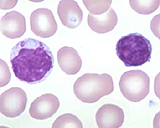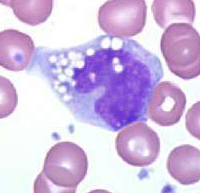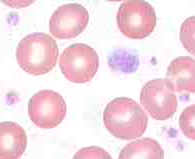Identify lymphocytes of various
sizes and with various amounts of cytoplasm.
- Lymphocytes
are easy to spot, but not quite as numerous as neutrophils.
How does the agranulocytic nature of
lymphocytes correlate with their function?
 Identify the second type of
agranulocyte: the monocytes. Note the distinctive size
and nuclear shape of these cells. Identify the second type of
agranulocyte: the monocytes. Note the distinctive size
and nuclear shape of these cells.
When and where do monocytes become
functional?
 Identify platelets (thrombocytes), noting their size, their lack of nuclei, their
distribution (singly or in clusters), and their ultrastructural
features. Identify platelets (thrombocytes), noting their size, their lack of nuclei, their
distribution (singly or in clusters), and their ultrastructural
features.
How might the size and structural
features of platelets aid their function?
Give at least one major
function for each of the types of the seven formed elements just
studied.
So, where does
it all happen? |